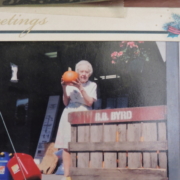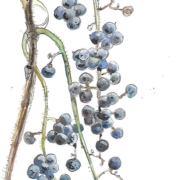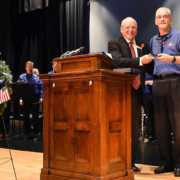Against All Odds
The Nats, The Eagles, The American Game
By Matthew Bass
Let’s relive that amazing season and the World Series victory locals have waited so long to get. It’s wrapped in a little of our local history, too.
The Washington Nationals’ accomplishment this year symbolizes how sports are a unique and compelling part of the American experience. In late May, at 19–31 through their first 50 games, they were dead in the water. Oddsmakers gave them a 1.5 percent chance of winning the World Series. There was talk of firing manager Davey Martinez and trading away big names like Max Scherzer. Then, following a few savvy additions of veteran role players like Gerardo “Baby Shark” Parra, former National Asdrubal Cabrera, and reliever Daniel Hudson, the Nats finally got healthy and went on a historic roll, blazing their way to a World Series championship.
There will be articles deservedly written about the exceptional statistics and records this team compiled en route to their ultimate victory. About how they were the best team offensively from the seventh inning on, or how no team had won four games on the road to win a seven game series. In any sport. Ever.
For those who followed the Nats through the doldrums of April and May, and witnessed their subsequent transformation, the exceptional
statistics were a byproduct
of something more special. Sure, there are stars on the team: Scherzer, Stephen Strasburg, Anthony Rendon (maybe the most underrated and definitely the most relaxed star in the game), and young phenom Juan Soto. But as this team battled into a wild card spot, coming from behind to beat the Brewers in the wild card game, then defeating the powerhouse Dodgers in five games, and sweeping a good Cardinals team before they matched up against the best team in baseball, a feeling that had been growing steadily all season manifested itself before our eyes. That feeling can and will be described in all the appropriate sports clichés: there’s no “I” in team, the name on the front of the jersey is more important than the name on the back, and so on.
And cliché and overused though these sayings are, they should remind us about the values that sports instill in our collective conscience. Nowhere else in the world do kids from all backgrounds have the opportunity to play such a variety of sports through so many levels — from recreational leagues to travel teams to high school, college and beyond.
Baseball was my number one sport (among others) growing up. And from Little League through high school ball, nothing could imitate the feeling of running out of the dugout with “CC” on our hats and “Eagles” emblazoned on our jerseys. I was fortunate to be a part of two Eagles teams that made deep runs into the State playoffs in the spring of 2000 and 2001. As an anecdotal aside, our 2001 playoff run included a victory over a highly touted pitcher from Goochland High School — his name was Justin Verlander. You might recognize him for his two losses to the Nationals in the World Series this year. He is undeniably a first ballot Hall-of-Famer, one of the greatest pitchers of his generation. Just not that night in Goochland in 2001,
when our Eagles, behind a masterful performance from Jonathan Larrick, defeated him 1-0, ending his high school career. But that’s a story for another day.
There are individual heroes in sports. In this playoff run, one can point to a number of them for the Nationals. There were Scherzer’s gutsy, not-quite-100 percent performances; huge hits by Soto, Rendon,
Howie Kendrick, Adam Eaton; and “Mr. Nat” Ryan Zimmerman. The National’s first pick
after moving to D.C. in 2005, and a Virginia boy who played at UVA, he hit the first home run in
National’s Park, and then the first in the World Series off the Astros’ unhittable ace Gerrit Cole.
Then, of course, there is World Series MVP Stephen Strasburg, with nothing short of a dominant postseason, including two epic performances in the World Series. Perhaps Strasburg (coincidentally, Strasburg High School was our archrival in 2000-2001) best exemplifies the transformation of this team from a talented group with big names on the backs of their jerseys to a true team in
every sense of the word. In his earlier days, Strasburg was famously standoffish, isolative, and seemingly a bit of a lone wolf in the clubhouse. He would be shaken by an error behind him, obviously bothered by a call he didn’t get, appeared to glower in the dugout. But not this year, and not this fall. He battled, they battled. And they won. Strasburg smiled. That’s what makes this Nats team so special.
Among many lessons learned in sports competition, it teaches the joy of success and the agony of failure and defeat, self-sacrifice, teamwork, hard work, pain, fight, heart, a belief that you’re never out of it until the last out is made, the final buzzer sounds, the clock runs out, and the proverbial fat lady sings. This Nationals team demonstrated that time and again by coming from behind in all of their elimination games this postseason — the Wild Card game, Game 5 at the Dodgers, and ultimately in Game 7 of the World Series. From dancing in the dugout, to Scherzer and Strasburg staring down one of the most potent offenses in baseball, to Anthony Rendon calmly picking up his buddy Trea Turner after a controversial umpiring call (you know the one!) by hitting a massive two-run homerun to alter the course of Game 6, you never felt that this team was out of the fight. Sure, they were down, but they weren’t out.
And that’s the point. When the game is about more than the individuals playing it, that’s when greatness happens. Our Eagles baseball team was lucky enough to experience that feeling firsthand in 2000-2001, but that experience is shared almost every day across towns, cities, counties, and states throughout our country. And that’s what makes sports special in America. It’s the belief that when you come together and play for each other, not for yourself, but for your team, for your community, for a greater purpose, you can overcome any obstacle, no matter the odds.
That’s how you go from 19-31 to a World Series championship. How appropriate it is in a month when our national divisions will be highlighted by every news media outlet across the nation that the Washington Nationals demonstrate the core American
ethos that belief in each
other and never giving up can result in greatness. It is moments like this, though they may happen in a game played by children, that should remind us all that even in divisive times like these we can,
and will, overcome. Against
all odds.








